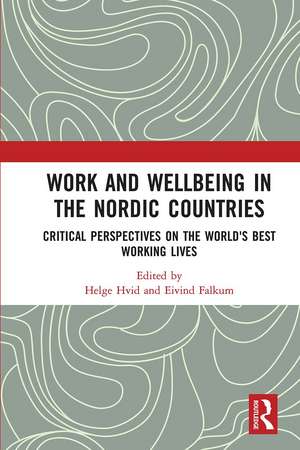Work and Wellbeing in the Nordic Countries: Critical Perspectives on the World's Best Working Lives
Editat de Helge Hvid, Eivind Falkumen Limba Engleză Paperback – 30 sep 2020
This book examines working conditions in Norway, Denmark, Sweden and Finland. It explores how these good working conditions are created and maintained. The chapters explain:
- How work organization is formed
- How education, training and work place learning give access to the labour market
- How work is managed in the public sector
- How precarious work unfolds in the Nordic countries.
Work and Wellbeing in the Nordic Countries is addressed to all those who have interest in the quality of working life. It will be of particular use to all students, academics and policy makers working in the fields of social policy, wellbeing, management studies, employment relations, work sociology and work psychology.
| Toate formatele și edițiile | Preț | Express |
|---|---|---|
| Paperback (1) | 251.36 lei 6-8 săpt. | |
| Taylor & Francis – 30 sep 2020 | 251.36 lei 6-8 săpt. | |
| Hardback (1) | 1175.65 lei 6-8 săpt. | |
| Taylor & Francis – 7 dec 2018 | 1175.65 lei 6-8 săpt. |
Preț: 251.36 lei
Preț vechi: 313.81 lei
-20% Nou
Puncte Express: 377
Preț estimativ în valută:
48.10€ • 52.41$ • 40.53£
48.10€ • 52.41$ • 40.53£
Carte tipărită la comandă
Livrare economică 23 aprilie-07 mai
Preluare comenzi: 021 569.72.76
Specificații
ISBN-13: 9780367663841
ISBN-10: 0367663848
Pagini: 386
Dimensiuni: 156 x 234 x 25 mm
Greutate: 0.68 kg
Ediția:1
Editura: Taylor & Francis
Colecția Routledge
Locul publicării:Oxford, United Kingdom
ISBN-10: 0367663848
Pagini: 386
Dimensiuni: 156 x 234 x 25 mm
Greutate: 0.68 kg
Ediția:1
Editura: Taylor & Francis
Colecția Routledge
Locul publicării:Oxford, United Kingdom
Public țintă
PostgraduateCuprins
Introduction. Helge Hvid and Eivind Falkum; Part I. An overview: Introduction. Helge Hvid and Eivind Falkum; Chapter 1. Nordic working life, shaped through conflicts and compromises. Helge Hvid, Eivind Falkum, and Arild Henrik Steen; Chapter 2. The peculiar history of Nordic working life. Eivind Falkum, Helge Hvid, and Per Bonde Hansen; Part II. Organization and management in a working life perspective: Introduction. Helge Hvid and Eivind Falkum; Chapter 3. Democracy at work. Heidi Enehaug, Eivind Falkum and Helge Hvid; Chapter 4. Workplace democracy under pressure. Eivind Falkum, Ida Drange, Heidi Enehaug and Bitten Nordrik; Chapter 5. International management concepts meeting Nordic working life. Peter Hagedorn-Rasmussen and Pål Klethagen; Chapter 6. Working environment regulation in Norway and Denmark. Jan Erik Karlsen, Klaus T. Nielsen and Robert H. Salomon; Chapter 7. New working time and new temporalities – The Erosion of influence and rhythms in work. Henrik Lambrecht Lund; Part III. Learning, inclusion and equality: Introduction. Helge Hvid and Eivind Falkum; Chapter 8. Young people’s access to working life in three Nordic countries – what is the role of vocational education and training? Christian Helms Jørgensen; Chapter 9. A new bargaining agenda for continuing education: A Norwegian case of ‘lifelong learning unionism’. Anders Underthun and Ida Drange; Chapter 10. Tackling increasing marginalization: Can support-side approaches contribute to work inclusion? Kjetil Frøyland, Angelika Schafft and Øystein Spjelkavik; Part IV. Nordic approaches to New Public Management: professions in transition – Introduction. Annette Kamp, Agnete Meldgaard Hansen and Christin Thea Watne; Chapter 11. Nordic New Public Management – the case of Denmark. Annette Kamp and Agnete Meldgaard Hansen; Chapter 12. Welfare professionals in transformation – the case of elderly care. Agnete Meldgaard Hansen and Annette Kamp; Chapter 13. Welfare professionals in transformation – the case of police officers in Norway. Christin Thea Wathne; Part V. Terms of employment: Precarious work in a Nordic setting – Introduction. Helge Hvid and Eivind Falkum; Chapter 14. Precarity in Nordic working life? Mari Holm Ingelsrud, Niels Warring, Janne Gleerup, Per Bonde Hansen, Anders Jakobsen, Anders Underthun and Søren Salling Weber; Chapter 15. Experiences of precarious work among graduates in the Danish labour market. Janne Gleerup, Anders Jakobsen and Niels Warring; Chapter 16. The formation and destabilization of the standard employment relationship in Norway: The contested politics and regulation of temporary work agencies. Per Bonde Hansen and Anders Underthun; Chapter 17. Working life on nordic labour platforms. Søren Salling Weber; Closure: The end of the story? Helge Hvid and Eivind Falkum; Index
Notă biografică
Helge Hvid is a professor at Roskilde University of Working Life Studies, Denmark. He has a PhD in Sociology from Copenhagen University. He has published extensively in working life issues such as psychosocial working environment, work organization, IT and work, rhythms of work and sustainable work.
Eivind Falkum is research professor at the University OsloMet. He holds a Dr. Philos grade within Political Science at the University of Oslo, with his thesis on power and opposition in the Norwegian working life. He has broad experience from organization and management studies in several empirical fields at different institutes of assignment research.
Eivind Falkum is research professor at the University OsloMet. He holds a Dr. Philos grade within Political Science at the University of Oslo, with his thesis on power and opposition in the Norwegian working life. He has broad experience from organization and management studies in several empirical fields at different institutes of assignment research.
Descriere
The Nordic countries have the world's best working life. This book explores how these good working conditions are created and maintained. It will be of interest to all students, academics and policy-makers working in the fields of social policy, wellbeing, management studies, employment relations, work sociology and work psychology.
